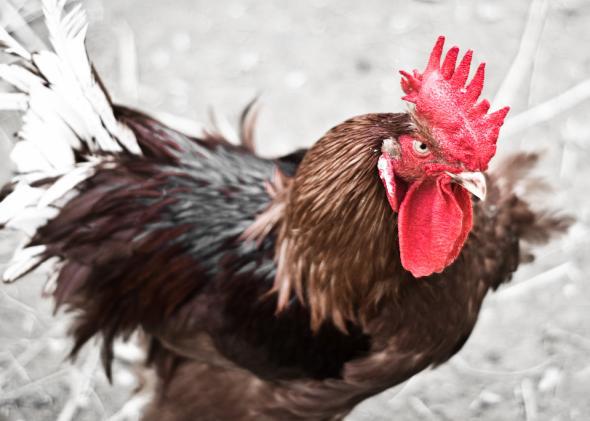Somewhere, Foghorn Leghorn is weeping. Reuters reports that fertility problems afflicting an important breed of rooster are leading to a shortage of chickens raised for slaughter and pushing up poultry prices in stores. What’s more, it looks like only evil humans are to blame for the current mess.
The rooster in question is Aviagen Group’s standard Ross male, which sires up to 25 percent of the chickens raised for slaughter in the U.S. Chicken producers have found that about 17 percent of eggs laid by Aviagen hens who mated with this kind of rooster failed to hatch—above the average failure rate of 15 percent. Scientists investigated and came to the shocking conclusion that genetic engineering had made the roosters susceptible to overfeeding.
Here’s Reuters talking to Sanderson Farms’ chief financial officer Mike Cockrell:
Aviagen sent a team of scientists to Sanderson last autumn to study the issue and has acknowledged that an undisclosed change it made to the breed’s genetics made the birds “very sensitive” to being overfed, he said.
“We fed him too much. He got fat. When he got big, he did not breed as much as he was intended to,” Cockrell said about the breed of rooster. “The fertilization went way down, and our hatch has been way down.”
Demand for chicken has been up this year as prices of other foods and meats in particular have surged. A deadly pig virus has decimated the pork supply while the domestic cattle herd is at its lowest level in more than 60 years. If that Fourth of July cookout seemed to take a bigger bite out of your wallet this year, it wasn’t just you. The cost of grilling has reached an all-time high this year, according to the official Bloomberg-complied barbecue index.
In its June report on livestock, dairy, and poultry, the U.S. Department of Agriculture noted that the poultry production forecast for the year had been lowered by 195 million pounds. The report also observes that hatching eggs in the first four months of 2014 were down slightly from the previous year.
Aviagen has replaced the impotent rooster breed with another kind of bird. Preliminary results of mating with hens are encouraging, and Sanderson Farms expects to have swapped out its roosters entirely by the fall. The company did not specify what will happen to its current male fowl, but we can only assume it won’t be good. For Sanderson, some roosters are more equal than others.
